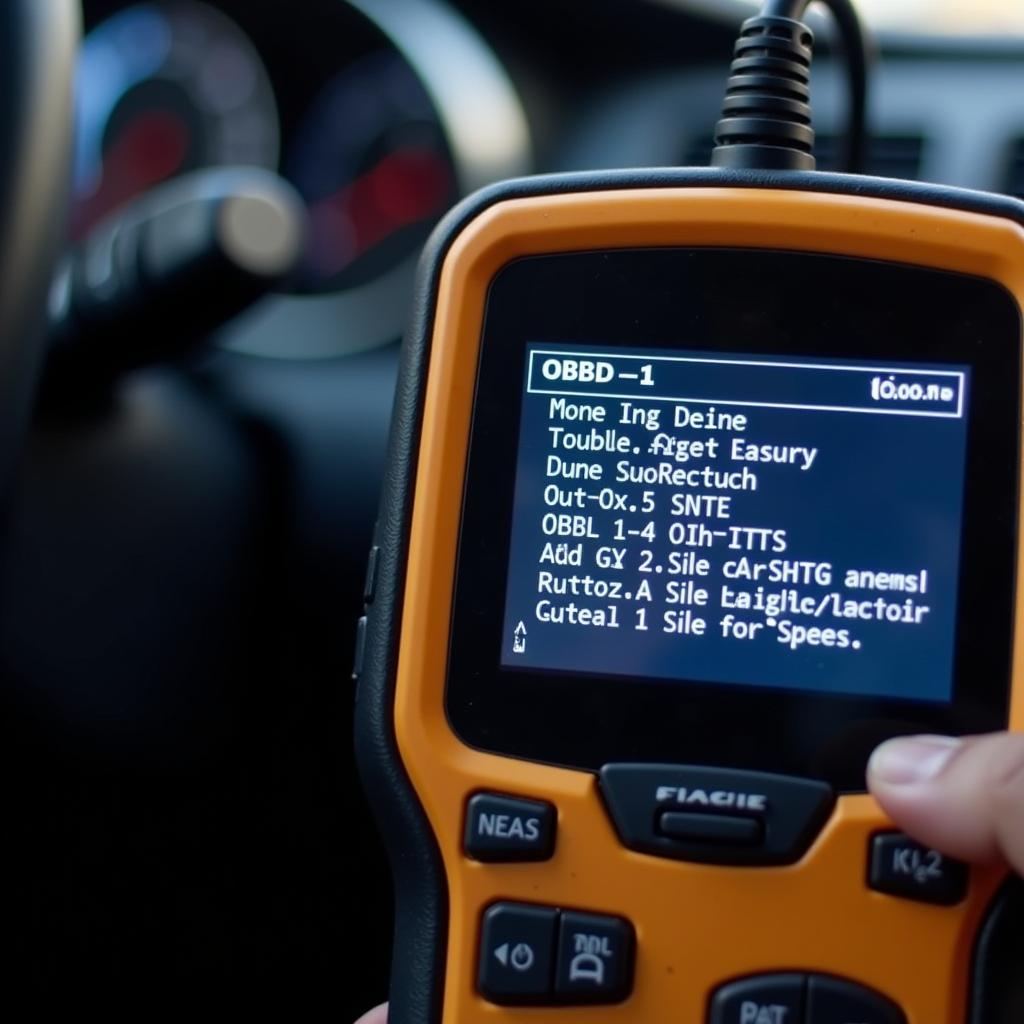Navigating the world of car diagnostics can feel like trying to decipher a foreign language. With so many options available, from basic code readers to professional-grade systems, figuring out “What Car Diagnostics Is Best” for your needs is key. Whether you’re a DIY enthusiast wanting to check your engine light or a seasoned mechanic searching for advanced functionalities, this guide will break down the different types of car diagnostic tools and help you find the perfect match.
Understanding Your Diagnostic Needs
Before diving into the best car diagnostics, let’s determine your specific requirements. Asking yourself these questions can help:
- What’s your level of automotive knowledge? Are you comfortable with basic car maintenance, or do you have more advanced mechanical skills?
- What types of vehicles will you be diagnosing? Different systems work best with specific makes and models.
- What’s your budget? Prices can range significantly, so knowing your limitations is important.
- What features are essential for you? Do you need something to read and clear basic codes, or are you looking for more advanced functionalities like live data streaming and bi-directional controls?
Types of Car Diagnostic Tools: From Basic to Advanced
Car diagnostic tools have come a long way from simple code readers. Here’s a breakdown of the most common types:
1. Code Readers: Your Pocket-Sized Problem Solver
For basic DIY diagnostics, a code reader is a great starting point. These compact devices plug into your car’s OBD-II port (usually located under the dashboard) and can:
- Retrieve Diagnostic Trouble Codes (DTCs): When your check engine light turns on, a code reader can tell you why.
- Clear Codes: After addressing the issue, you can use the code reader to clear the DTC and turn off the check engine light.
Pros: Affordable, user-friendly, portable
Cons: Limited functionality, may not provide detailed code definitions
[where to get a free car diagnostic](https://diagfixpro.com/where-to get-a-free-car-diagnostic/)
2. Handheld Scanners: Taking Diagnostics Up a Notch
Handheld scanners offer a step up from basic code readers, providing more in-depth information and functionalities:
- Read and Clear Codes: Like code readers, they retrieve and clear DTCs.
- Display Live Data: Monitor your vehicle’s sensor readings in real-time, such as engine RPM, coolant temperature, and oxygen sensor data.
- View Freeze Frame Data: Access a snapshot of your vehicle’s sensor readings at the time a fault code was stored.
Pros: More features than code readers, relatively affordable, often come with manufacturer-specific code definitions
Cons: May not offer advanced functionalities like bi-directional controls, can be less user-friendly than code readers
3. Professional-Grade Scan Tools: The Mechanic’s Best Friend
For professional mechanics and serious DIYers, professional-grade scan tools are the gold standard. These sophisticated systems offer a comprehensive range of features, including:
- Advanced Code Reading and Clearing: Provide detailed code definitions, including manufacturer-specific codes.
- Comprehensive Live Data: Monitor a vast array of sensor readings and parameters in real-time.
- Bi-Directional Controls: Interact with your vehicle’s systems to test components, such as actuators and solenoids.
- Programming and Coding: Perform software updates, key programming, and module coding (depending on the make and model).
Pros: Unmatched functionality, access to advanced diagnostic capabilities, can pay for themselves over time if you frequently work on cars
Cons: Expensive, require a higher level of automotive knowledge, may not be necessary for basic DIY diagnostics
 OBD2 Scanner for Car Diagnostics
OBD2 Scanner for Car Diagnostics
Choosing the Right Car Diagnostic Tool: Factors to Consider
With the different types of diagnostic tools in mind, here are key factors to help you make the best choice:
- Frequency of Use: If you only need to check your engine light occasionally, a code reader might suffice. For frequent use or professional purposes, consider a handheld scanner or professional-grade tool.
- Vehicle Compatibility: Ensure the tool you choose is compatible with the make, model, and year of your vehicle(s).
- Budget: Set a realistic budget and explore tools within your price range. Remember to factor in the cost of any necessary software updates or subscriptions.
- User Friendliness: Consider your comfort level with technology and choose a tool with an interface that you find intuitive and easy to navigate.
- Features: Prioritize the features most important to you, whether it’s basic code reading, live data streaming, or advanced functionalities like bi-directional controls.
“When selecting a diagnostic tool, prioritize your specific needs and budget. A clear understanding of your requirements will guide you towards the right investment.” – John Miller, Certified Master Automotive Technician
Beyond the Basics: Emerging Trends in Car Diagnostics
The world of car diagnostics is constantly evolving, with new technologies and trends emerging all the time. Here are a few to watch out for:
- Wireless Diagnostics: Bluetooth and Wi-Fi-enabled tools offer greater flexibility and convenience, allowing you to access diagnostic information wirelessly from your smartphone or tablet.
- Cloud-Based Diagnostics: Cloud storage and analysis of diagnostic data are becoming increasingly prevalent, offering features like remote diagnostics, predictive maintenance, and access to vast databases of technical information.
- Augmented Reality (AR) Diagnostics: AR technology is being integrated into diagnostic tools, overlaying real-time data and repair instructions onto the real world through smartphones or smart glasses.
how much is a diagnostic fee for a car
Conclusion: Empowering You to Take Control of Car Diagnostics
Finding the best car diagnostic tool boils down to understanding your needs and researching the options available. Whether you’re a DIYer or a professional, the right tool can empower you to diagnose and address car problems effectively, saving you time, money, and frustration in the long run. Remember, staying informed about the latest trends in car diagnostics ensures you have access to the most efficient and effective tools for the job.

Leave a Reply